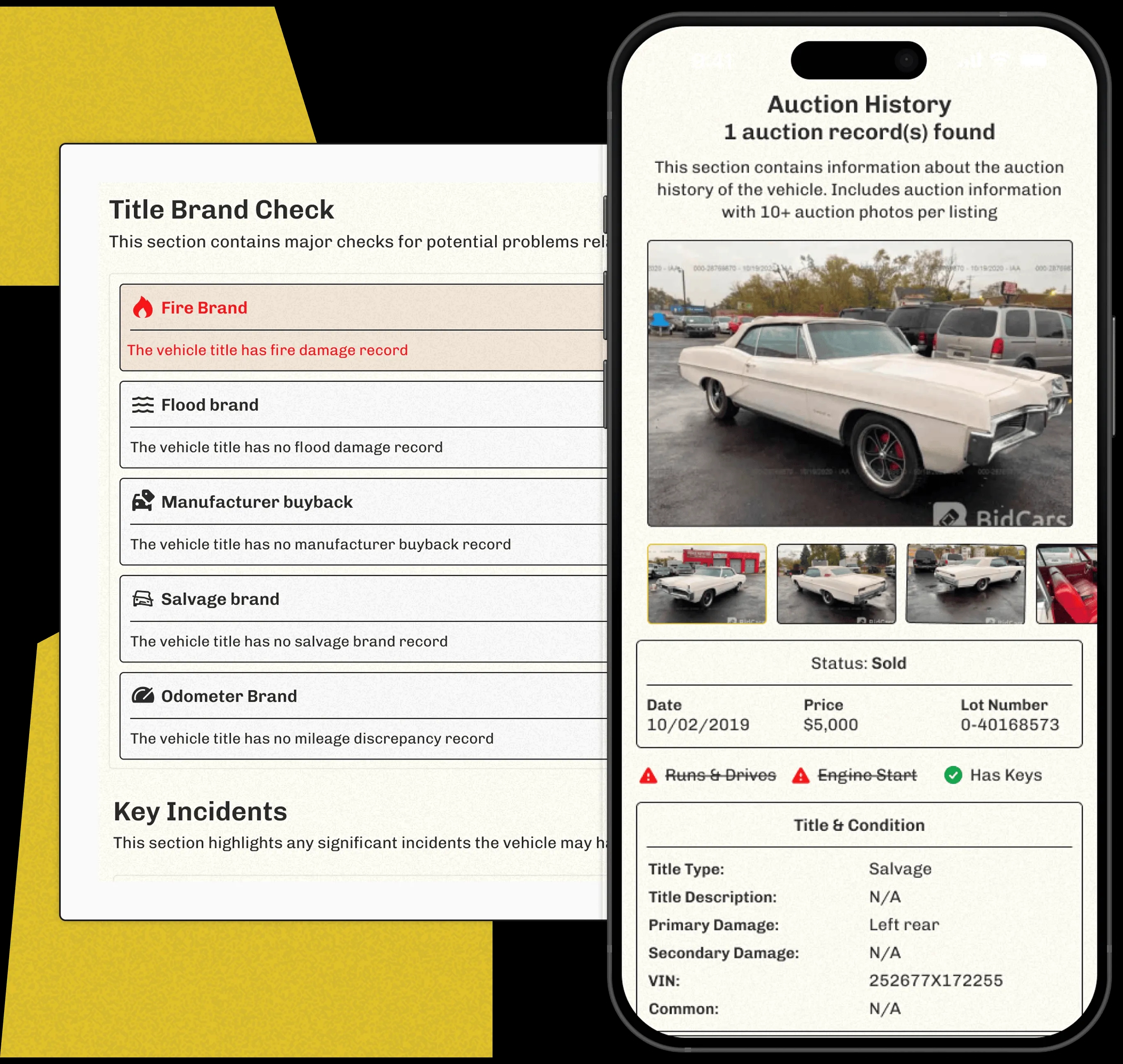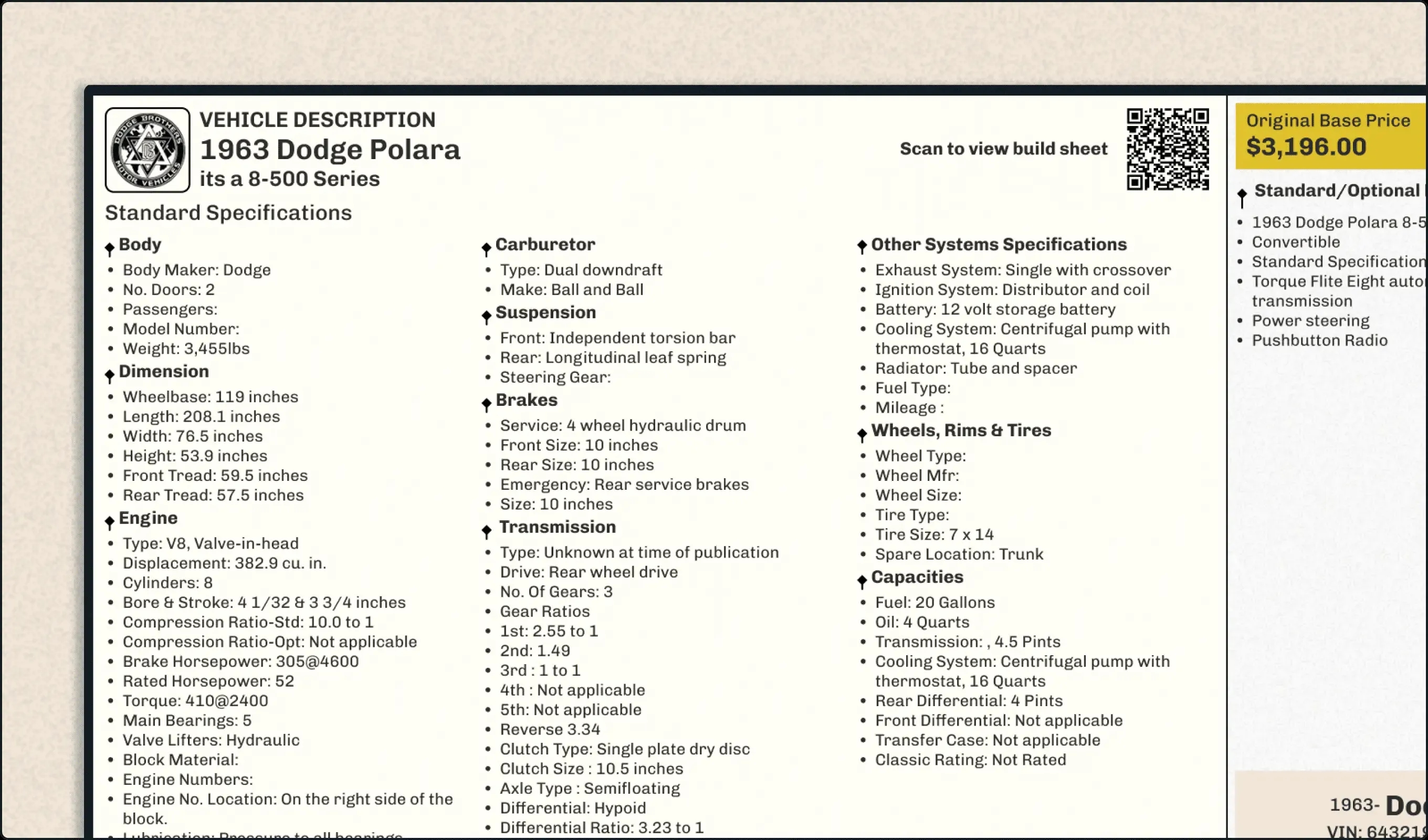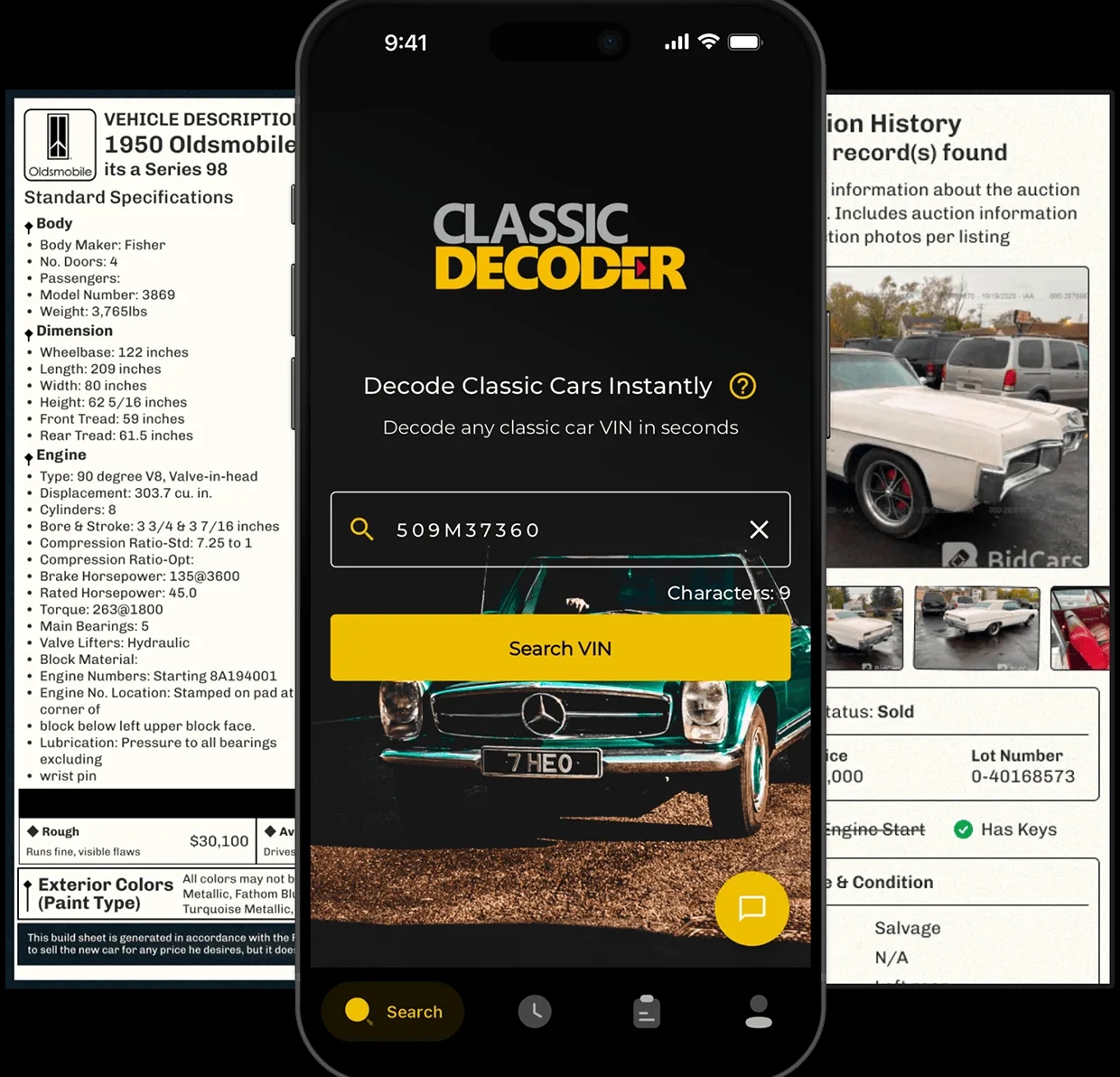1969 Chrysler 300
The 1969 Chrysler 300: a muscle car legend! Big, bold, and undeniably cool. Its hidden-headlight look was iconic, reflecting the era's powerful, luxurious vibe. A true American classic, it cemented Chrysler's place in muscle car history and remains a head-turner today.
Decode Classic VINs to Get Vehicle History Report and Build Sheet
The 1969 Chrysler 300: A Classic Car Enthusiast's Dream
Cruisin' through the annals of automotive history, the 1969 Chrysler 300 emerges as a monumental figure in the world of classic cars. With its bold design and powerful engine lineup, this iconic vehicle captures the wild spirit of late 1960s America—a time synonymous with innovation and unbridled horsepower. Okay, we've all seen those vintage beasts in movies and pictures, but this one's got stories you'd want to hear about.

1969 Chrysler 300 Models:
Select the vehicle's model to see the correct data for it.
How Much is Chrysler 300 Worth?
Original MSRP :$4,087.00
Outstanding
Clean
Average
Rough
1969 Chrysler 300 Specs
Interested in buying a classic car or selling one?
Access detailed history reports for classic vehicles from hundreds of manufacturers.
- Accident Records
- Theft Records
- Loan & Lien Information
- Auction Information
- Salvage Information and more

History of Chrysler 300
Let's time-travel a bit. The Chrysler 300 made its grand entrance in the market during an era when muscle cars were all the rage. I mean, the late 1960s were about as revolutionary for cars as bell-bottoms were for fashion. This model evolved on the C-body platform, showcasing a spacious interior all cupped in that lengthy hood and rear deck design. Talk about making a statement on the road.
Design and Production Context
The 1969 Chrysler 300 didn't just roll off the production line; it was produced in a time of competing giants in the auto industry. They were racing to design vehicles suited for the expansive highways popping up across America. These highways, like Interstate 5, mind you, propelled a growing love for long-distance driving, which in turn raised interest in cars just like this.
Legacy and Pop Culture
Can we even talk about cars without touching on pop culture? The Chrysler 300 was not just an engineering wonder but found its home in music, television, and films, embedding itself deeper into American hearts. Television shows like "Marcus Welby, M.D." featured this beauty, adding to its fame.
Learn more about a classic car: Get Build Sheet by VIN.
Access reproduced classic build sheets to learn more about your classic vehicle details.
- Standard Specifications
- Original Base Price
- Standard & Optional Equipment
- Exterior & Interior Colors
- VIN ID & Location description

Famous Figures Who Own the Chrysler 300
Who doesn't love a good celebrity car story? The allure of the Chrysler 300 piqued the interest of numerous celebrities back then.
Johnny Cash
Who comes to mind first? None other than Johnny Cash, the man in black himself. His ownership elevated the car's mystique and allure, kind of like how a signature guitar completes the aura of a rock star. It's said Johnny's preference for the Chrysler 300 resonated with his fans, too, making it a collectible icon.
Dr. Welby from Television Fame
Then, there's the fictional, yet ever-enduring Dr. Welby from "Marcus Welby, M.D." who drove a slick 1969 Chrysler on the show. Talk about product placement done right! This appearance only amplified the car's prestige on the cultural spectrum.
Specifications and Performance Metrics
Now onto what rev-heads truly care about—engine prowess. It's thrilling to note that the Chrysler 300 wasn't just another pretty face. This model, built for performance, wowed everyone with its HEMI engine. For motorheads, that's a big deal.
Speed Records
Historically, Chrysler didn't hold back on the speed front. Whether it's setting records on the Bonneville Salt Flats or dominating NASCAR tracks, this car showed up and showed out. There's something wildly American about a car defying limits and pushing boundaries.
1969 Chrysler 300 Gallery


Price Records and Market Status
When it comes to classic cars, valuation is a fickle beast. As with many collectibles, the price of the Chrysler 300 today reflects its condition, rarity, and market demand. Recently, these beauties have sold for upwards of $40,900 on average, though some in lesser condition can be had for much less—down around the $11,000 mark. That's quite the range, illustrating just how desired this car can be depending on who owns it and where it stands on the condition scale.
Interested in Buying or Selling a Classic Car?
Hey, are you considering jumping into the world of ? One can't overstate the importance of knowing a car's history before making any purchase. It's not just a vehicle; it's a piece of history. Whether you're perusing classic car classifieds or have your eye on a local auction, having a is invaluable.
Accident Records
Theft Records
Loan & Lien Information
Auction Information
Salvage Information and more
Understand the nuances of the vehicle. Consider a , especially for those older, rare makes that don't always come with a paper trail. And yes, for those with quirky VINs, a or a can be your best buddies.
Exploring the , you'll get the lowdown on what made these vehicles roar on the roads of yesterday. It's like reading the DNA of your future classic compagnon de voyage.
Classic VIN Decoder App |Now available on both Android and iOS!
At Classic Decoder, we believe that developing a mobile app is a great way to extend our classic car data solution hub to as many users as possible across the globe. Our app is built with users and precision in mind. It holds the key to unlocking the history and details of any retro car at your fingertips. It also comes with fascinating and user-friendly features that make it stand out from other mobile apps designed for this purpose.
The Classic Decoder app lets you decode and lookup any classic VIN in a flash. Access accurate vehicle information and history, make an informed decision faster, and buy and trade in classic cars with confidence.

Download The Classic Decoder App now.
Some unique features include:
- Support all classic VIN lengths from 5 to 13 digits
- Support classic cars produced from 1910 – 1980
- Online Garage features – to add and manage your vehicles
- 24/7 Customer Support
- Easy onboarding for first-time users
Explore Chrysler 300 from Other Years
Frequently Asked Questions
Well, the '69 Chrysler 300, let's be honest, it's a real head-turner. Think long, low, and luxurious; that's the vibe. It's easily recognizable by its distinctive styling, featuring a long hood, a short deck, and a pretty aggressive front end. You'll also notice the hidden headlights, a feature that was all the rage back then – it was super cool! The overall design is, frankly, iconic and screams 'classic American muscle.' They weren't messing around with this one; it's a substantial car, with a powerful presence on the road. A true American classic, that's for sure. You'd really have to see one up close to fully appreciate the details, you know what I mean?
Ah, the heart of the beast! The 1969 Chrysler 300 packed a serious punch under the hood. Most commonly, you'd find a 440 cubic-inch V8, a real powerhouse; it's like a giant, rumbling heart providing all that power. Some models even boasted a massive 426 Hemi, that was a pretty exclusive option — only for those who wanted the ultimate muscle car experience, of course. These engines provided exhilarating performance. However, let's be real, these aren't exactly fuel-efficient – it guzzled gas like crazy, but hey, you didn't get this kind of power for free back then, right?
Okay, so handling isn't exactly what you’d call its strongest suit. Let's be realistic, it's a big, powerful car; it's not going to feel like a nimble sports car. Think of it more like a luxurious barge, gliding down the highway – it’s comfortable, though, and you'll enjoy cruising on the open road. It's a comfortable ride for its time, but don't expect razor-sharp cornering. It's more about relaxed cruising than sporty driving. It's totally different from modern cars, so be aware of the differences.
Now, this is tricky. The value of a 1969 Chrysler 300, honestly, depends so much on its condition, its originality, and what options it has; it's not a simple answer, you know? A pristine, fully restored example could fetch a pretty penny – we're talking tens of thousands of dollars. But a car needing some TLC might be significantly less. To get a reasonable idea, checking online resources specializing in classic car valuation would be useful. You might even find a sweet deal if you do your homework, I’m not kidding!
Owning a classic car, especially one like this, isn’t for the faint of heart. Expect to tackle some maintenance challenges. These cars are getting up there in age, you know. Common problems include things like the carburetor, the electrical system, and the brake system - they sometimes need regular attention. Finding parts can also be tricky; sometimes you have to scour the internet or even search junkyards. It's part of the charm, I guess. But just be aware that owning one requires a serious commitment to keeping it in good shape. It’s a labor of love, for sure.

